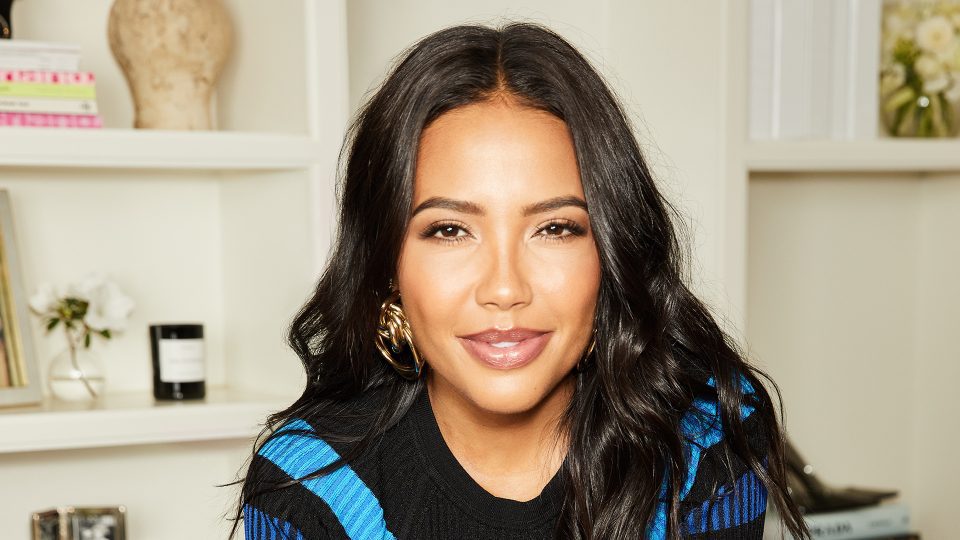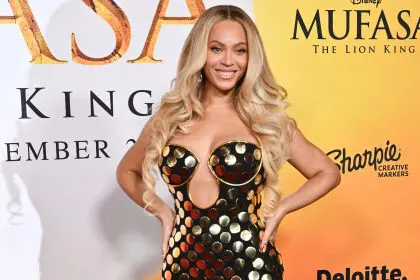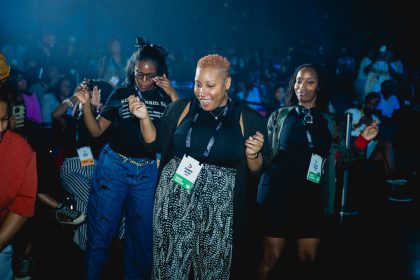
Emma Grede wants you to know that she’s a college dropout. “I used to have a real hangup about not having a formal education — especially when you start hiring great people,” Grede says. “But it takes all sorts. I’ve had a different path — and that’s really worked for me.”
It sure has.
Today, Grede, 40, guides two powerhouse fashion brands: She’s the co-founder — with Khloé Kardashian — and CEO of body-inclusive denim company Good American, and she is chief product officer at Skims, the shapewear label she co-founded alongside her husband, Jens, and Kim Kardashian. She’s also co-founder of plant-powered cleaning brand Safely and a recurring judge on Shark Tank, the first Black woman investor to appear on the show. Oh, and did we mention she’s the mother of four?
Now based in Los Angeles, Grede grew up in East London with three sisters. When she couldn’t make ends meet while attending the London College of Fashion in 1997, the then-17-year-old dropped out to get a job. After working in clothing boutiques, Grede landed an internship at a luxury consumer PR firm and began working at fashion show productions. In 2008, she founded Independent Talent Brands, a talent management and entertainment marketing agency. It was at ITB that she’d get her first serious inkling of what fashion could be.
While casting for different global campaigns, Grede, a petite spitfire of a person, noted a disconnect between fashion’s narrow beauty ideals and what women actually looked like. She saw it in the way most fashion labels — many of which are run by men — catered only to women in single-digit sizes. She also noticed a stark division in the fashion industry: There were places where thin women could shop and places where plus-size women could shop, and never the twain did meet. “I wondered, ‘If you gave a size-22 woman a pair of black vinyl skinny pants, would she buy them?’ She doesn’t even have the choice,” Grede says. “Someone made that choice for her.”
Her goal with Good American was to shift away from what she saw as the industry’s unrealistic body and beauty standards so that women felt they were represented in all facets of the fashion business, from the product to the sizing to the marketing. “It was really about making a difference in the way women are seen and celebrated,” says Grede. After a conversation with Khloé Kardashian — whom she met through her mother, Kris Jenner — about the way the industry leaves out so many women, Grede realized the two of them shared a vision about how they could empower all women. They co-founded their company in 2016.
The industry is now waking up to what Grede has known for a long time. Driven by fashion magazine endorsements, the prevalence of curvy models, and rising demand, the plus-size market is thriving and shows no signs of slowing down. According to global market research firm Future Market Insights, total revenue for adult plus-size apparel was $276 billion in 2022 and is projected to reach $499 billion by 2033. In 2018, contemporary women’s clothing brand Loft announced a plus-size category, and that same year Marks & Spencer debuted its first plus-size collection, calling it Curve. In January 2021, Vogue featured glamorous curve model Paloma Elsesser (size 14) on the cover.
When Good American launched — in jean sizes from 00 to 24 — it sold $1 million of product in just 24 hours. Later, after finding that customer returns of sizes 14 and 16 jeans were 50 percent greater than any other sizes, the company pioneered a size 15.
Fashion insiders are impressed by Grede’s understanding of the consumer — and her prescience. “She seems able to have one foot in what people want now and one in what they don’t know they’ll want tomorrow,” says retail guru Rachel Shechtman, who sold her narrative-driven concept store, Story, to Macy’s in 2018. “She’s two steps ahead while being close enough to capitalize on the demand.”
Grede’s passion for inclusivity is both innate and smart marketing. “I didn’t set out to create a diverse company,” she says. “That just happens when your ideals, your aesthetic, and your belief system are that of somebody who was raised with a Black dad and a White mother.”
Good American uses open casting to find people of all sizes, shapes, and ethnicities to model its clothes on its website and social feeds; it has 2.3 million followers on Instagram and over 187,000 followers on TikTok. The attention helped the company raise an undisclosed amount in a venture round in 2019 from Alliance Consumer Growth and Imaginary Ventures. Good American shared that it hit over $200 million in 2022, up from $160 million in 2021. One of its biggest sellers, says Grede, is those black vinyl skinny pants, which regularly sell out in sizes 22 and 24 plus. It seems her hunch was right.
Yet Grede will tell you that her biggest insight in running a company — and her life — is knowing when to ask for help. By way of example, she says she’s “unbelievably” dyslexic — especially with numbers. So she surrounds herself with people who are numerically adept. “That’s part of my success: doing what I’m really good at and outsourcing everything else.” She believes she wouldn’t be able to do her job without a team — Good American currently has 105 employees. And she relies on a team to help her at home. “Raising kids really does take a village,” she says. “And I pay the village to help me get through the day.”
Despite her success, Grede remains grounded by her past — and she honors the fact that she, too, was once in need of help and mentorship. To this end, last year, Grede started an incubator program called Good Inc. to put a spotlight on up-and-coming talent, mentoring young fashion creatives and debuting collections on Good American’s online platforms. “It’s about lifting up underrepresented groups and figuring out who wouldn’t get the financing or the opportunity,” Grede says. The first two participants were music executive Caroline “Baroline” Diaz of the B Project, a new clothing line, and Prentis, the assistant to Good American’s lead stylist, who launched a hand-painted denim line. The company was unable to confirm if more entrepreneurs are expected to debut their lines later this year.
Grede’s commitment to these young entrepreneurs springs from the desire to help those who, like her, have had a wayward path to success — just a highly driven college dropout lifting up those around her. “For women in business, often our paths are less traditional,” she says. “There is no linear journey.”











